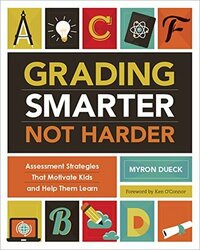Take a photo of a barcode or cover
8 reviews for:
Grading Smarter, Not Harder: Assessment Strategies That Motivate Kids and Help Them Learn
Myron Dueck
8 reviews for:
Grading Smarter, Not Harder: Assessment Strategies That Motivate Kids and Help Them Learn
Myron Dueck
Dueck definitely echoes many of the beliefs and concerns I have regarding traditional grading and assessment practices, and he also recommends ways to address this topic- providing some solutions to the "but what about..."s that are often asked by educators. Dueck writes from the point of view and philosophy that what we are doing in assessment and grading is a remnant of what we experienced as students, and that it doesn't serve us or our students. It is very apparent that for him, ensuring that students learn is the most important thing about being a teacher. To that end, he considers what is necessary for learning to take place, and he addresses the issues of poverty, relationships with students, the high pressure to succeed placed on some students, etc. Within the book, Dueck shares issues and strategies related to grading, homework, unit plans (syllabi/ rubrics/ unit "goals"), retesting, and creativity.
I found some great validation of my own personal beliefs and philosophies about teaching, grading, and assessing in Dueck's book. Dueck has conducted thorough research of the topic and has an extensive number of references and works cited, but he also shares personal anecdotes of what he has tried and what has worked or not worked in his own classroom. There are a number of rubric, checklist, and "contract" examples in the book that may be very helpful to educators. This book is a bit more directed to teachers teaching middle and high school than elementary, and that made it only a little less relevant for me. One other thing I sensed was that, even though he believed differently, Dueck found a way to be within the range of what was "accepted practice" at times. It was as though he knew if he went too strongly, people would be turned off and wouldn't read the book. I get this, but there are times when I wish he would just "stick it" to the people who use "gotcha" practices in grading (assigning zeroes, never allowing retests or second chances, etc.). All in all, this was a good read with some practical applications.
Maybe because I spent most of my career in special education, where most assessments are designed to provide information on the specific goals in each student's IEP, I have never understood this culture of carrots-and-sticks we use to determine grades. It doesn't motivate any but the most competitive students and the punitive nature of some grading practices can have real consequence not just on the student's self-esteem and confidence as a learner, but on their future college enrollment and/or employment prospects. WE did this. WE, educators, created a culture where completing classwork has become about accumulating points rather than about accumulating knowledge and skills. Dueck lays out a very cogent argument for why we should change that culture, and includes practical strategies for doing so that worked for him. I am definitely using this book as a book study for my teachers next year.
In the best case scenario, we take comfort in our principles, but feel the wrath of students and parents who feel neglected and/or wronged. Even if we agree that the results aren't ideal, we can't imagine an alternative policies and practices that seem fair and consistent to all students. Dueck to the rescue.
Grading Smarter is an excellent read for teachers who feel frustrated with their grading policies and practices and yearn for fresh alternatives. By redirecting the scoring focus exclusively to the learning goals, Dueck points the way past inaccurate and inappropriate grading practices that have pretty much been the norm in my 25 year classroom experience. For example, penalizing students for situations out of their control (abusive home situations, poverty, mental illness, executive function issues, etc.) is inherently inappropriate. And doling out zeros won't help. The key to change is found in distinguishing between scoring your learning goals (such as "causes of the Civil War") and behaviors (such as "turning work in on time").
I know. You want to teach your students good habits like punctuality. Me too. But grades aren't the way to do it, and Dueck provides evidence to back up this claim, as well as a slew of alternative practices that more successfully encourage those behaviors.
The shift to emphasize learning goals is really a shift to Standards Based Grading. Grading Smarter doesn't drill down into this topic, but there are plenty of other authors who do (Robert Marzano is probably at the top of the list.) That's a long leg up on the climb to grading smarter and one that will take a significant amount of additional thought and time by most teachers. So the initial shift probably is more time-consuming than staying the course.
But as the title implies, most of the necessary changes don't require more of your time, just a reallocation. That's because Dueck's practice shifts the teacher's efforts from tasks such as scoring homework, to tasks such as re-scoring some summative assessments revised by students who want to do better. Before you balk at the thought of giving kids a "second chance", think about how you yourself learn anything worthwhile. Learning takes time and practice. Expecting kids to get it right the first time, condemns many of them to failure (or a B, or a C, or a D).
For Dueck, assessments are generally traditional tests: multiple choice, short-answer, essay. Allowing students a chance to re-do a portion of a test (using some pretty clever time-saving, but accurate techniques), will be a significant shift in the common wisdom of many teachers. But frankly in my experience, the common wisdom hasn't worked well. That awful feeling I've had about students who fail, or merely limp along with a D or C-, when I know they could be doing much better, tells me these are techniques to embrace. They are practical and doable.
There are two ways that I think Dueck's work could be improved — but they may not be for everyone. First, Dueck uses pen and paper to carry out some of his practices. As a techie sort of person, I have already converted these to Google Forms and Docs and have provided links on my course website. Students have ready access to use these without the need for me to photocopy and store them in my shared classroom(s). And I don't need to collect and organize completed paperwork from them. I can find them all on my laptop.
Second, and more importantly, although Dueck does suggest projects as an alternative, he seems to emphasize traditional tests. I believe these significantly narrow the range of students who will ultimately succeed — even with Dueck's practices. I'm a strong believer in project-based learning (PBL) because it provides more opportunities for student engagement, deeper and more personalized learning opportunities, and signficant practice with skills that are more transferrable.
Nevertheless, there are no conflicts between PBL and Dueck's smarter grading techniques. Grading Smarter is a fresh approach to some age-old schoolhouse dilemmas. In the slow crawl away from factory schooling, Dueck provides the means to take a big step forward.
I struggle with grading and assessment and found this had some good ideas on how to face these situations. He clearly exp!wins what is going on and how to face the situation.





